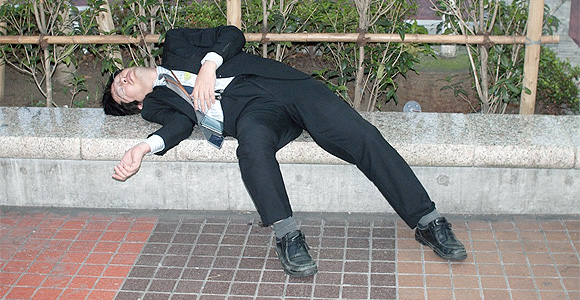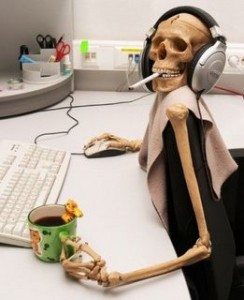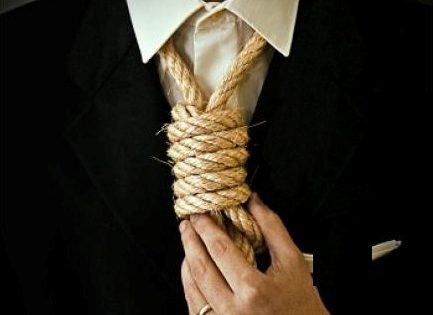I remember hearing the term a few weeks ago. On the phone for a radio interview, Katie—the competent woman on the other line—asked me my motivation for writing Day Job to Dream Job.
Without pausing, I said with complete sincerity:
“Because day jobs kill people.”
I waited for her response. Rather than the typical shock or disagreement, she said:
“Why of course!”
“Of course?” I questioned.
“Yes. Of course. Karōshi.”
“Karōshi?”
There seemed to be an echo in our interview. Unfortunately for me, I was the one asking the questions instead of giving the answers.
I’d heard of Kashi before. But that was cereal. I knew this interviewer was different than the norm, but I didn’t think she was referencing breakfast food.
When you’re an author on a particular topic you don’t want to sound ignorant. Coming off informed and intelligent is preferred. Caught off guard, there was no use in pretending. So instead of a charade, I settled for the truth instead.
“Karōshi? I’m sorry. I’ve never heard of that.”
Lucky for me she was incredibly gracious. And in the midst of my confession, I simultaneously googled “Karōshi. Although, I believed in authenticity, I also valued “interview recovery.”
You know, she continued, the Japanese term which means “death from overwork…”
“…of yes…occupational sudden death…” I chimed in. (Thanks google.)
“Wow…Katie. I had no idea they created a word for this condition.”
She went on to inform me about this tragic and fascinating phenomenon.
Karōshi is a legitimate killer
According to the International Labour Organization:
Karoshi is a Japanese word meaning death from overwork. This term has been used since the 1970s. In 1978 there was a report on 17 karoshi cases. Karoshi is not a pure medical term but a sociomedical term that refers to fatalities or associated work disability due to cardiovascular attacks (such as brain strokes, myocardial infarction or acute cardiac failure) aggravated by a heavy workload and long working hours.
The phenomenon was first identified in Japan, and the word is now adopted internationally. The media have frequently used the word because it emphasizes the sudden deaths (or disabilities) caused by overwork which should be compensated. Karoshi has become an important social problem in Japan.
 Sadly, we’re seeing an increasing trend for Karojisatsu too (suicide from overwork and stressful working conditions).
Sadly, we’re seeing an increasing trend for Karojisatsu too (suicide from overwork and stressful working conditions).
Long work hours, heavy workloads, lack of job control, routine and repetitive tasks, interpersonal conflicts, inadequate rewards, employment insecurity, and organizational problems could become psychosocial hazards at work.
Common causes of overwork or occupational stress:
- Long and excessive hours.
- Stress accumulated due to frustration at not being able to achieve the goals set by the company.
- Forced resignation, dismissal and bullying.
- Suffering of middle management due to laying off workers.
6 signs you might be a candidate
 Not it America though, right?
Not it America though, right?
Wrong. According to Dan Miller, author of 48 Days to the Work you Love, the warning signs are in America too. If you suffer from these symptoms, you could be a prime candidate for Karōshi. Do you struggle with:
- STRESS = 70% of American workers experience stress-related illnesses.
- BURN-OUT = 34% think they will burn out on the job in the next two years.
- HEART ATTACKS = The Los Angeles Times reports that there is a 33 percent increase in heart attacks on Monday mornings.
- INJURY = Entrepreneur magazine adds that there is a 25 percent increase in work-related injuries on Mondays.
- DEATH = According to the National Centers for Disease Control and Prevention, more people die at nine o’clock Monday morning than at any other time of day or any other day of the week.
- SUICIDE = Male suicides are highest on Sunday nights, with men realizing that their careers-and possibly their finances as well-are not where they want them.
Day jobs killing people? Really?
Remember, death comes in many forms. You may not be in danger of dying physically. But day jobs kill many ways—emotionally, spiritually, and relationally. Remember Swiss Psychologist Carl Jung’s haunting research:
The most damaging thing in the life of a child is the unlived life of the parent.
Imagine 18 years of seeing your parent only half-alive. That’s a high price to pay.
Save your life. Check out Dream Job Bootcamp.
No hype, just hope.
We have an experience called Dream Job Bootcamp. We help you go from PRISON to PLAN to PAYOFF by crafting your Dream Jobber Plan. Our next one launches soon. (Video below)

[…] Nursing, social workers, and physicians are no strangers to burnout. Japan even has a term for working yourself to death! In industries such as teaching, many professionals feel as if everything they do has to be their […]
[…] and the work force is fiercely suffering from it. So what’s Karoshi you might ask? Put simply, Karoshi means working yourself to death. It’s actually an epidemic that shockingly many suffer from. […]